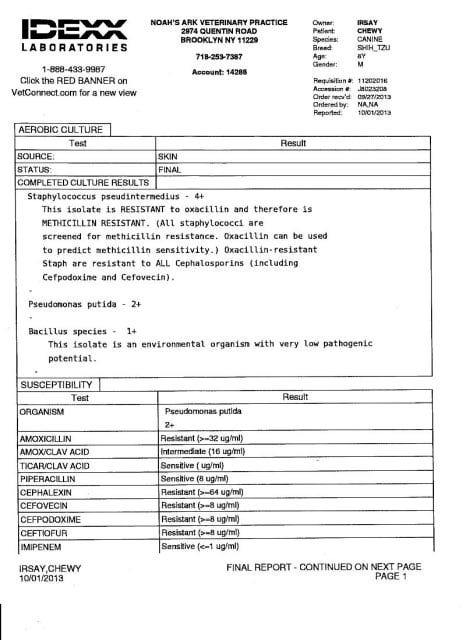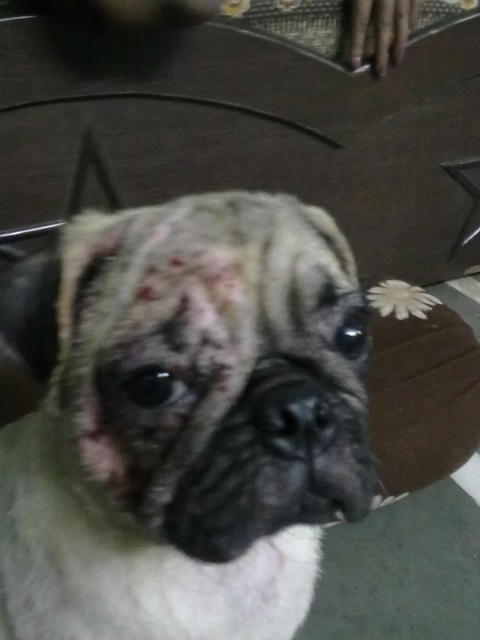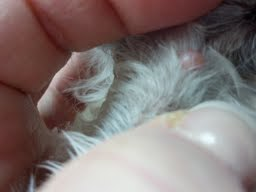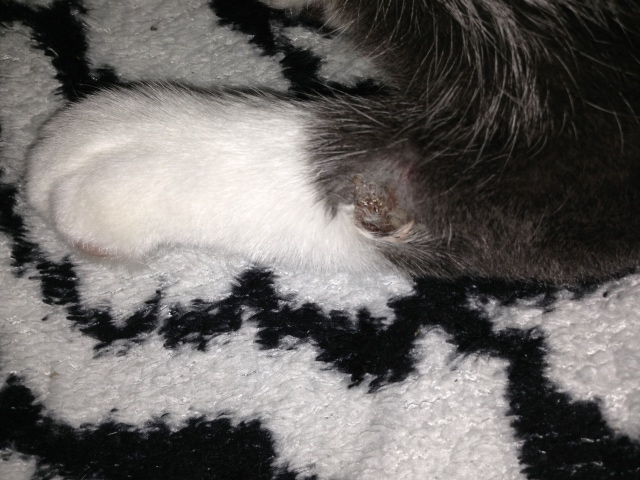QuestionHello,
Four years ago my family rescued a stray female kitten. We did not know how old she was at the time of her rescue, but she was old enough that her eyes were open and she could eat partially solid food (she was, however, tiny enough fit comfortably in a woman's palm). She was raised with our other five cats, all of whom were all rescues of various ages. She was spayed at a couple months of age, and we had no problems with her for a couple years; she was a delightful, talkative little creature, and just about the cuddliest thing imaginable.
But starting approximately two to two and a half years ago she developed an unusual problem. Every couple weeks she would exhibit behaviors similar to a cat in heat: she becomes what I can only describe as obsessively affectionate to us and all the other animals in our house, including our dog, all to which she sidles up and rubs her hindquarters against (in addition to our furniture). She also spends an excessive time licking her genital area, spraying surfaces while quivering her tail, and vocalizing very loudly and practically non-stop for the entire cycle.
As you can imagine this creates a stressful environment very quickly, not only for myself and my family, but for our other pets as well. It causes much bickering among the cats, and sometimes fights. When these behaviors don't get her any results she seems to vent her frustration on the other cats.
This does not simply last a few weeks a couple times a year. When she begins this cycle it will come every couple weeks for nearly the entire year.
We have tried correcting the behavior when it comes about, spoke with our veterinarian and a few local cat experts about the matter, and even re-homed her a couple times to see if the problem would abate in an environment where she was the only cat present. As you might suspect, she has been returned to us from both of the homes she went to. The first time she was re-homed we had what we hoped was a development of progress: she stopped all the undesirable behaviors BUT took up urinating on family surfaces (couches, towels in the bathroom, etc.). When she came back to us we took her to our Veterinarian, whom we have used for many years, and he discovered that she had a serious urinary tract infection. We got the necessary medicines and, when she was on the mend, re-homed her to a second home. Unfortunately, she is returning a second time to us; though her urinary tract infection has healed and she uses the litter box very diligently, her obsessive yowling began initially in her new home and, after a short abatement of a couple weeks, began again in earnest and has pushed her out of their good graces.
Since it has become apparent that a single-cat environment is not helping her problem we are prepared to keep her. Do you have any advice on how we might possibly diagnose or temper this undesirable and very tiresome behavior?
I have heard it said sometimes reproductive tissue can be missed when a cat is spayed at too young an age and that can cause undesirable hormonal behavior, but I am not sure whether this is speculation or fact. Do you have any thoughts?
Besides this issue, she is a very healthy cat. She is exceedingly intelligent, her coat is very sleek and well maintained, her weight is ideal, she is energetic and an excellent hunter, her eyes are clear, and her nose does not run. Out of all our cats she is one who gets the most compliments for her graceful beauty. She lives in an indoor-outdoor environment with plenty of opportunity for stimulation and exercise, and is given plenty of love and attention.
Any advice is greatly appreciated.
AnswerHi Tyra,
You have a pretty complicated case here. I don't know if the yowling is in sync with the "heat- like cycles" or not, but it's common for those two to be connected.
As far as her behavior in this regard, I would ask your vet first give her a very thorough exam in her genital region to see what might be going on down there, then to try some hormone therapy on her to see if that alleviates the symptoms. If that doesn't work, then I suggest you have your vet do an exploratory laperotomy (exploratory surgery) on her to see if she has an overgrowth of tissue on her cervical stump. It's not real common but it's not rare either. Of course it's the last thing you want to try. It could also be bladder related- infections, stones, etc.
We have seen it before in females and sometimes the hormones do the trick, sometimes not.
Have you tried Amitriptyline with her as well? Sometimes, that alone does the trick. I am a huge fan of drugs with cats but sometimes it's all that's left in your bag of tricks. I would consult your veterinarian, not local cat experts, and ask what is available in that line.
However, with the excessive licking in that area she could very well have a cyst in her vulva or some tissue that is causing these behaviors.
So start with a complete exam of that area by your vet then try hormone therapy. These things are difficult but sometimes the answers are very simple.
Always start with the exam, maybe some blood work to determine her hormone output. If it's elevated then she could very well have some cystic issues going on.
Let me know what you come up with.

 Ciprofloxacin
Question
Skin Culture Report Culture Report Page
Ciprofloxacin
Question
Skin Culture Report Culture Report Page
 quries abut my pug
Question
image645.jpg"
my pug puppy name to
quries abut my pug
Question
image645.jpg"
my pug puppy name to
 Heartworm treatment side effects
Question
Charlie
My dog, Charlie, is a 30lb. mut
Heartworm treatment side effects
Question
Charlie
My dog, Charlie, is a 30lb. mut
 Small growth my dogs face
Question
growth photo 2 growth photo 3
Hi.
Small growth my dogs face
Question
growth photo 2 growth photo 3
Hi.
 I think my cat may have got bit by a Brown Recluse Spider
Question
Right leg bite mark Again
I am ve
I think my cat may have got bit by a Brown Recluse Spider
Question
Right leg bite mark Again
I am ve